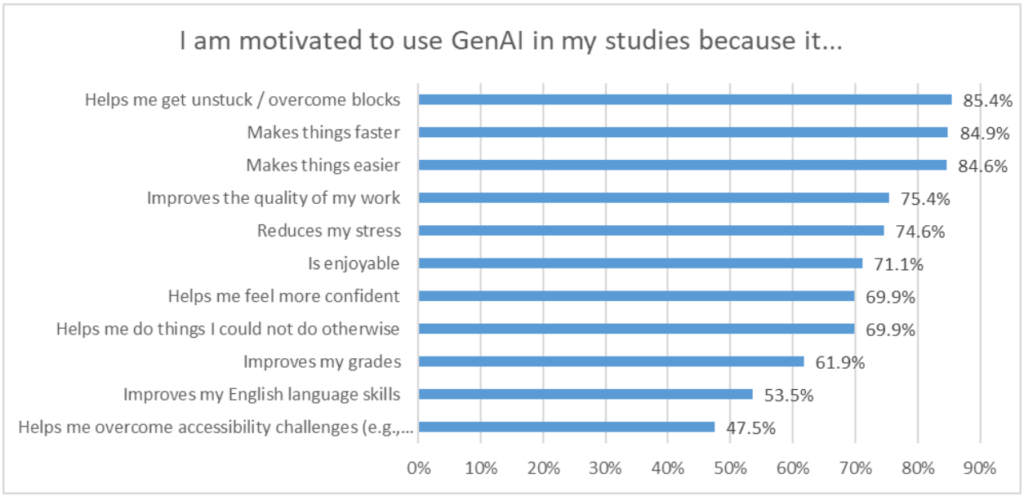Our cross-institutional survey of 8,028 university students found that 85% of students use AI because it makes tasks faster and easier.
One interpretation of this result may be to think students are being lazy. However, an alternative interpretation is that students are being strategic with their time. Anecdotally, an increasingly large proportion of the workforce, including educators, are using generative AI to help them in daily tasks; so it is not surprising students are doing the same.
One of the respondents in our study wrote that generative AI was a “powerful resource for mundane tasks that would not be worth for a human (me) to complete.[for example] tasks where the input required e.g. typing in 100 numbers into an excel box does not require a human touch or skill and can save time.”
When we look closer at the data we can see that there are a variety of motivations that help us to better understand the complex needs and aspirations of students. In addition to speed and ease, they are also motivated (85%) to use generative AI because they feel it helps them get unstuck or overcome blocks.

Students also see generative AI as helping them to improve the quality of their work, reducing their stress, and giving them greater confidence in their studies. One of our survey respondents said: “It’s like having an on-demand second set of eyes. At least it can try to point out some mistakes.”
70% of students reported that AI helps them do things they couldn’t otherwise accomplish, showing that students often view AI as a tool for expanding their capabilities. Further, almost half (48%) use AI to overcome accessibility challenges.
While students are motivated to use generative AI in their studies, they are also cautious about its impact on their deeper learning. Students’ use of generative AI is moderated by a desire to do it themselves (93%) and are cautious that it can “make things up” (97%).
Students have a wide range of motivations for their use of generative AI. Not least because it: “prepares me for a changing world, including the workplace, where GenAI skills, including prompting will be a potential hiring expectation.”
Rather than assuming students are offloading effort, we could embrace the idea that generative AI can support efficiency, enhance quality, and extend capabilities. Universities could benefit from integrating structured AI literacy programs into their curriculum (for students and educators), enabling them to make productive use of AI while understanding its appropriate applications.
By positioning AI as an asset that enhances learning and productivity, universities can better equip students for improved outcomes, and workplace preparedness.
Professor Michael Henderson (Monash University), Dr Jennifer Chung (Deakin University), and Alice Yu (Monash University) representing the Students and AI collaborative project team of 20 scholars from 4 universities. More at AIinHE.org.

